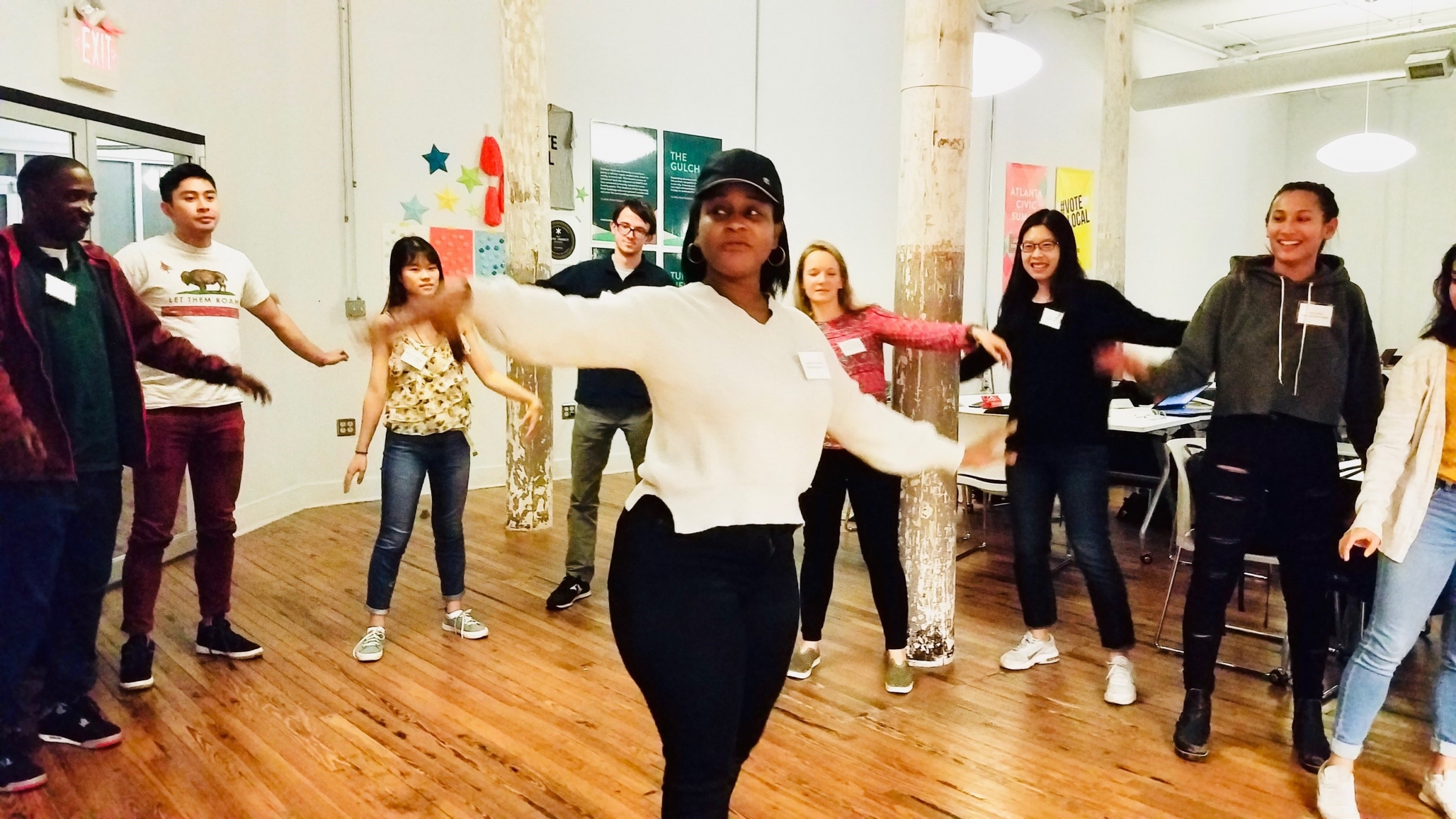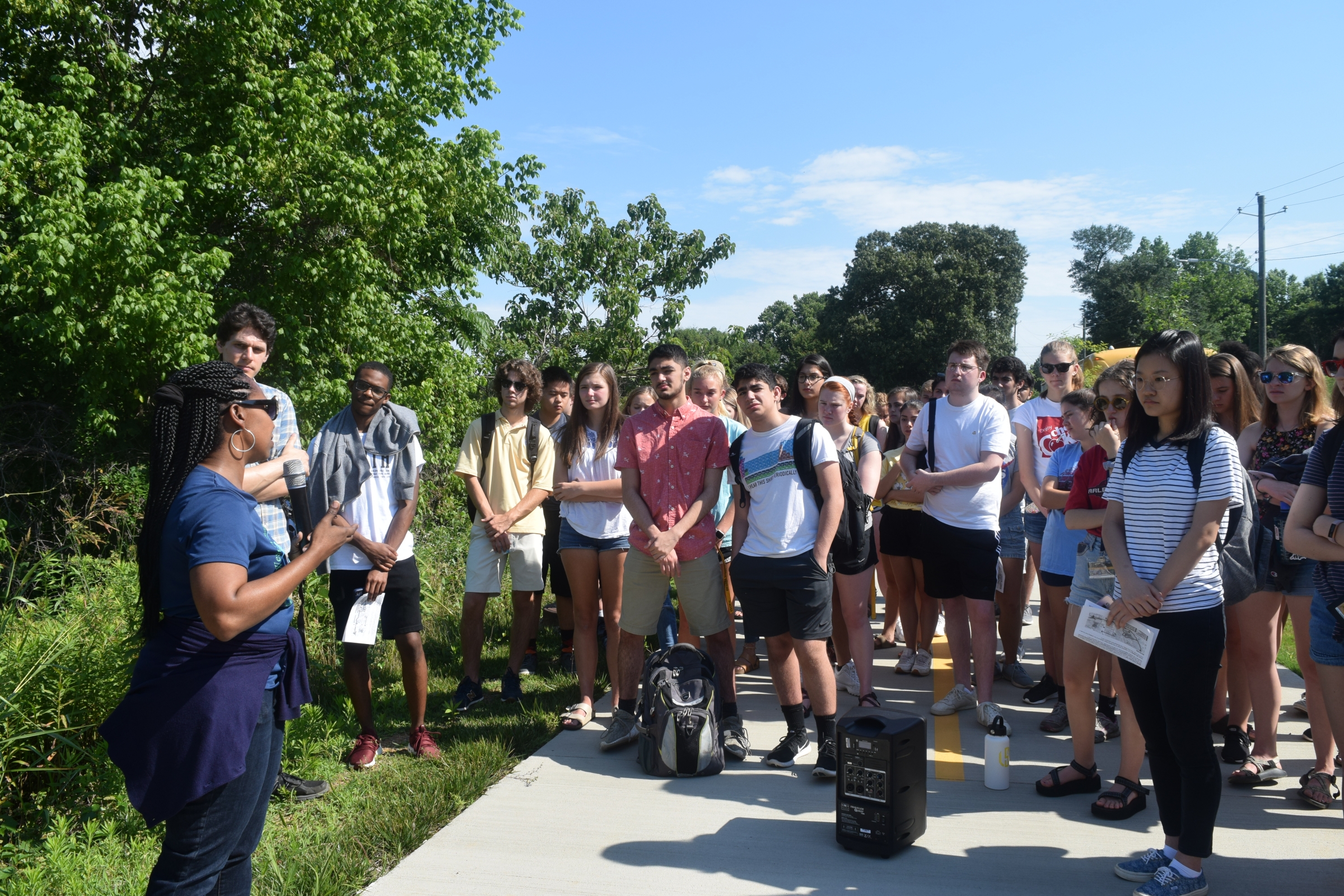In November, Dori Pap from GT’s Institute for Leadership and Social Impact (ILSI) published the first of four blog posts that we are writing on Social Innovation, “Social Innovation – Where Do I Start?,” sharing a multitude of ways that students can learn about the topic, inside and outside the classroom. In this December post, we explore the question – what is Social Innovation, anyway?
Many people, when they think of social innovation, think right away of one or two models. The first is the business model, which has profit generation as the first priority and social impact as the second. For example, many people are familiar with Tom’s Shoes, which became famous in 2006 for giving away a pair of shoes for free every time a pair was bought. The second is the philanthropic model, also grounded in the success of global businesses, through which large foundations, such as the Gates Foundation, MacArthur Foundation, and Ford Foundation, identify priority areas of focus and then pour billions of dollars into those areas in an effort to move the needle on large-scale societal and environmental challenges. For example, the Gates Foundation is well-known for its initiatives related to global health, such as malaria eradication. As funders, these foundations hold the power to influence others to work on the priorities that they deem to be most important and in the ways that they believe this work should be done.
Less known are community-driven models of innovation, in which people living in the communities facing the most challenges come up with innovative ideas, and resources from outside the community are mobilized to strengthen and advance those ideas towards solutions. This model prioritizes not only outcomes – the solution, or innovation, itself – but also the process by which we arrive at them, since research shows that the end result will be more effective and sustainable if it was developed through the leadership and participation of the people it impacts the most. Grassroots innovation scholar Adrian Smith (2017) writes: “the social innovation challenge is more complicated and challenging than ‘simply’ redirecting conventional innovation capabilities to social goals. Social innovation implies reinventing innovation itself: transforming dominant concepts and practices so that participation, deliberation and community become central.”
At Georgia Tech, we have been working to build an approach to social innovation that teaches and advances community-driven models of innovation. SLS and ILSI’s programs also have a special focus on supporting social and environmental initiatives and ventures that are led by people of color, in low-income communities of color, especially in the westside communities surrounding Georgia Tech. As we wrote in a Saporta Report column co-authored with one of our key social innovation partners, the Center for Civic Innovation, “a shared belief in the importance of supporting innovation led by Black women provides a rare example of how large institutions can propel the work of community leaders forward by playing supportive, rather than leading, roles” (April 2021).
Through our existing social innovation programs – such as the Sustainable Communities Summer Internship Program, MGT 4803: Social Impact, and the Ideas to Serve Competition – we have been developing and evolving our GT approach to social innovation, which operates like this:
GT’s ABCD* Approach to Social Innovation
- Engage partners as collaborators, experts, innovators, co-educators, and co-researchers (not as clients)
- Recognize community-based expertise and de-center academic expertise
- Support, strengthen, and advance existing, community-led innovations (organizations, initiatives, ventures)
- Establish long-term relationships
- Focus especially on innovators of color working in communities of color
- Take a systems approach to tackle root problems rather than symptoms, which involves focusing on:
- Problem Discovery
- Equity & Justice
- Community Assets
- Connecting Dots between Issues and Scales (e.g., local-global)
*ABCD=Asset-based Community Development. ABCD forms the basis of SLS’s approach to community engagement. It involves partnering with communities based on their assets, or strengths, as the foundation from which to address social and environmental challenges. Read more about ABCD here.
So - what does this look like in practice? Here are two examples of GT’s ongoing partnerships with social innovators in our own backyard that should give you an idea of what we’re talking about:
Center for Civic Innovation (CCI)
CCI has been supporting social entrepreneurs in Atlanta since 2014 to eliminate inequality through community-driven solutions. SLS’s partnership with CCI provides students with training in community-driven social innovation advanced by female entrepreneurs and entrepreneurs of color, with a more recent targeted focus on Black female entrepreneurs.

Since 2016, our relationship has grown from hosting one-off activities, such as a workshop in which faculty helped entrepreneurs brainstorm solutions to deep-seated business challenges, to co-running programs such as the SLS Social Innovation Buzz Course and the Summer Internship Program. Since 2019, we have been focusing on supporting entrepreneurs’ ventures by shepherding them across multiple programs. For example, in 2019, students assisted CCI entrepreneurs with various projects through the SLS Social Innovation Buzz Course. Two of these entrepreneurs – Carrie’s Closet and WUNDERgrubs - then hosted interns through our Summer Internship Program (and continue to host each summer) and became partners in the MGT 4803: Social Impact course, through which they worked with student teams to enter the Ideas to Serve Competition. Their entries focused on advocating for Georgia foster children’s rights to resources (Carrie’s Closet) and supporting digital literacy for farmers to improve their crop yield (WUNDERgrubs).
Simultaneously, SLS and ILSI continue to prioritize supporting and strengthening our organizational relationship with CCI. Dori Pap from ILSI serves on the CCI Board of Directors; CCI staff serve on SLS’s Partnership Advisory Council; GT signed on to CCI’s NPU Initiative in support of its recommendations for improving community engagement in Atlanta; and SLS works closely with CCI to build the capacity of CCI entrepreneurs to take maximum advantage of student partnerships through internships and courses. In 2020, CCI became SLS’s first Signature Partner, with each of us committing to work together over the long-term to deepen our relationship and support each other’s work.
West Atlanta Watershed Alliance (WAWA)
Established in 1998, WAWA’s mission is to “improve the quality of life within the West Atlanta Watershed by protecting, preserving and restoring our community’s natural resources” by “represent[ing] African American neighborhoods in Northwest and Southwest Atlanta that are most inundated with environmental stressors, but are least represented at environmental decision-making tables.” The WAWA StoryMap – developed with help from a GT SLS student intern – explains that WAWA was formed by older community members, with support from a few college students. Their work is deeply personal and grounded in community, as explained in this 2020 profile from People magazine of Dr. Na’Taki Osborne Jelks, one of their founders and one of SLS’s closest partners, “Activist Whose Mom Got Sick in 'Cancer Alley' Fights for 'Healthy Environments' for All.”

Over the past 20+ years, this deeply community-based organization, which started out all-volunteer, has successfully challenged development to preserve over 400 acres of green space. As the People profile suggests, WAWA’s work has gained national acclaim. In 2019, Dr. Osborne Jelks was profiled in The New York Times, in an article titled “Black Women are Leaders in the Climate Movement: Environmentalism, in other words, is a Black issue.” The subtitle of this article demonstrates the ways in which WAWA – along with other Black-led, community-grounded environmental and climate groups in the Atlanta region that have become well-known nationally over the past decade, such as the Center for Sustainable Communities, Eco-Action, and the Partnership for Southern Equity (all SLS partners) – are advancing what Echoing Green considers to be a type of innovation that is key to system change: shifts in narrative and representation – such as, in this case, reclaiming environmentalism as an issue of relevance to, and led by, people of color.
WAWA has partnered with SLS since its inception in 2016, through course projects, the Internship Program, and service opportunities such as the Westside River Rendezvous, WAWA’s annual community-wide water sampling event (see student reflections here and here). WAWA has also been an important partner in experimental and innovative research and education projects, such as our Public Interest Technology Student Fellows Program, which prepares engineering students to be able to incorporate deep community engagement into their technology-focused careers, and UrbanHeatATL, which is a community science collaboration between GT, Spelman College, WAWA, and others to map Atlanta’s urban heat islands (see this Atlanta magazine article about the project). As a partner in our iGniTe summer program, they collaborated with SLS to create a teaching tool, Environmental Justice and the UN SDGs: A WAWA Case Study. More broadly, WAWA was a founding member and leader of our United Nations-affiliated regional sustainability education network, RCE Greater Atlanta, and is collaborating with SLS and other partners from the network to develop a multi-stakeholder community science network that aims to establish collaborations that advance long-term community science research centered on community priorities. Read more about RCE Greater Atlanta in the article “Reducing Inequalities and Empowering Youth through the Multi-Stakeholder SDG Network, RCE Greater Atlanta,” co-authored by Dr. Osborne-Jelks, Dr. Jennifer Hirsch from GT SLS, and Lola Owokoniran from Kennesaw State University.
We hope these stories inspire you to get involved! With a new semester coming up, there is no better time to engage. Return to the first blog post in our series to read about all the different opportunities to start or continue your social innovation journey at Georgia Tech: Social Innovation – Where Do I Start?, and the third post about Social Innovation That Works. Come on and join us!